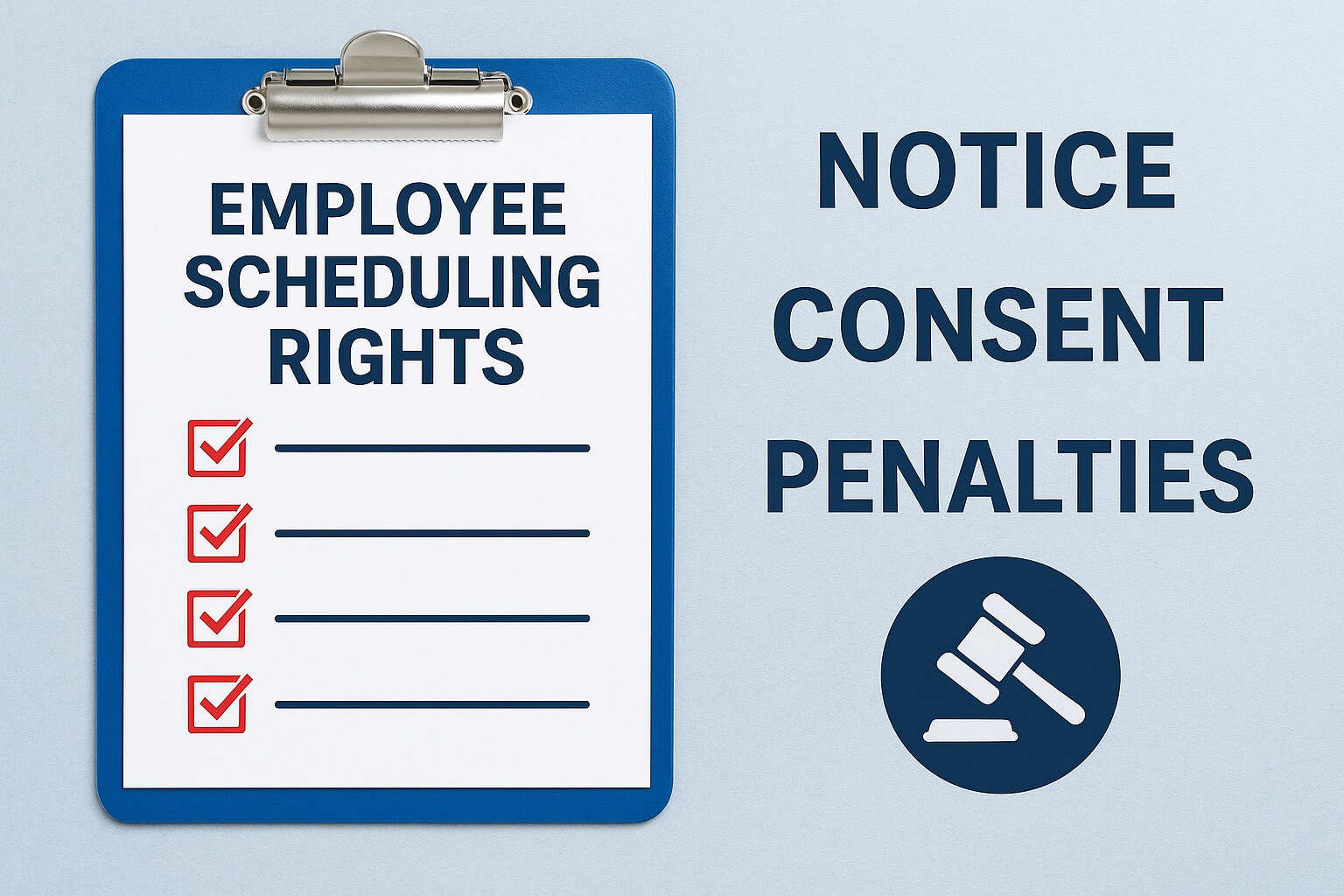Work scheduling disputes have become a defining issue for millions of American workers, particularly in retail, hospitality, and service industries. As employers increasingly use unpredictable scheduling practices to control labor costs, employees struggle to maintain work-life balance and financial stability. Understanding your rights regarding workplace scheduling can help protect your interests and ensure fair treatment under federal and state employment laws.
Can Your Boss Schedule You Without Asking Your Availability?
Under federal law, most employers have broad authority to set work schedules without consulting employee availability. The Fair Labor Standards Act (FLSA) requires proper payment for hours worked but doesn’t mandate that employers consider employee scheduling preferences when creating work schedules.
However, this general rule has important exceptions. Employers cannot use scheduling practices to discriminate against protected classes or retaliate against employees who exercise their legal rights. Additionally, a growing number of states and municipalities have enacted “fair workweek” or “predictive scheduling” laws that limit employer scheduling authority.
The key distinction lies between having input into your schedule versus having legally protected scheduling rights. While most employees can request specific scheduling accommodations, employers typically aren’t required to honor these requests unless they fall under specific legal protections such as disability accommodation, religious accommodation, or family medical leave.
Collective bargaining agreements often provide scheduling protections that exceed legal minimums, including seniority-based scheduling systems, advance notice requirements, and limits on consecutive shifts. Union contracts frequently address scheduling disputes through grievance procedures that provide faster resolution than legal action.
Understanding At-Will Employment and Scheduling Conflicts
The United States operates primarily under at-will employment principles, meaning employers can generally terminate employees for any reason not prohibited by law. This creates complex dynamics when scheduling conflicts arise, as employers may threaten termination when employees cannot work assigned shifts.
However, at-will employment doesn’t give employers unlimited authority over scheduling practices. Courts increasingly recognize that impossible scheduling demands can constitute constructive dismissal, particularly when employers schedule employees during times they’ve clearly indicated unavailability.
When evaluating scheduling-related termination, unemployment insurance offices and courts consider whether the employer created an impossible situation by ignoring reasonable availability limitations. Employees who are fired for refusing to work shifts during previously communicated unavailable times may still qualify for unemployment benefits.
The analysis becomes more complex when scheduling conflicts involve protected activities or characteristics. Employers cannot use scheduling as a pretext for discrimination or retaliation, even in at-will employment states. This protection extends to scheduling practices that disproportionately affect protected classes of employees.
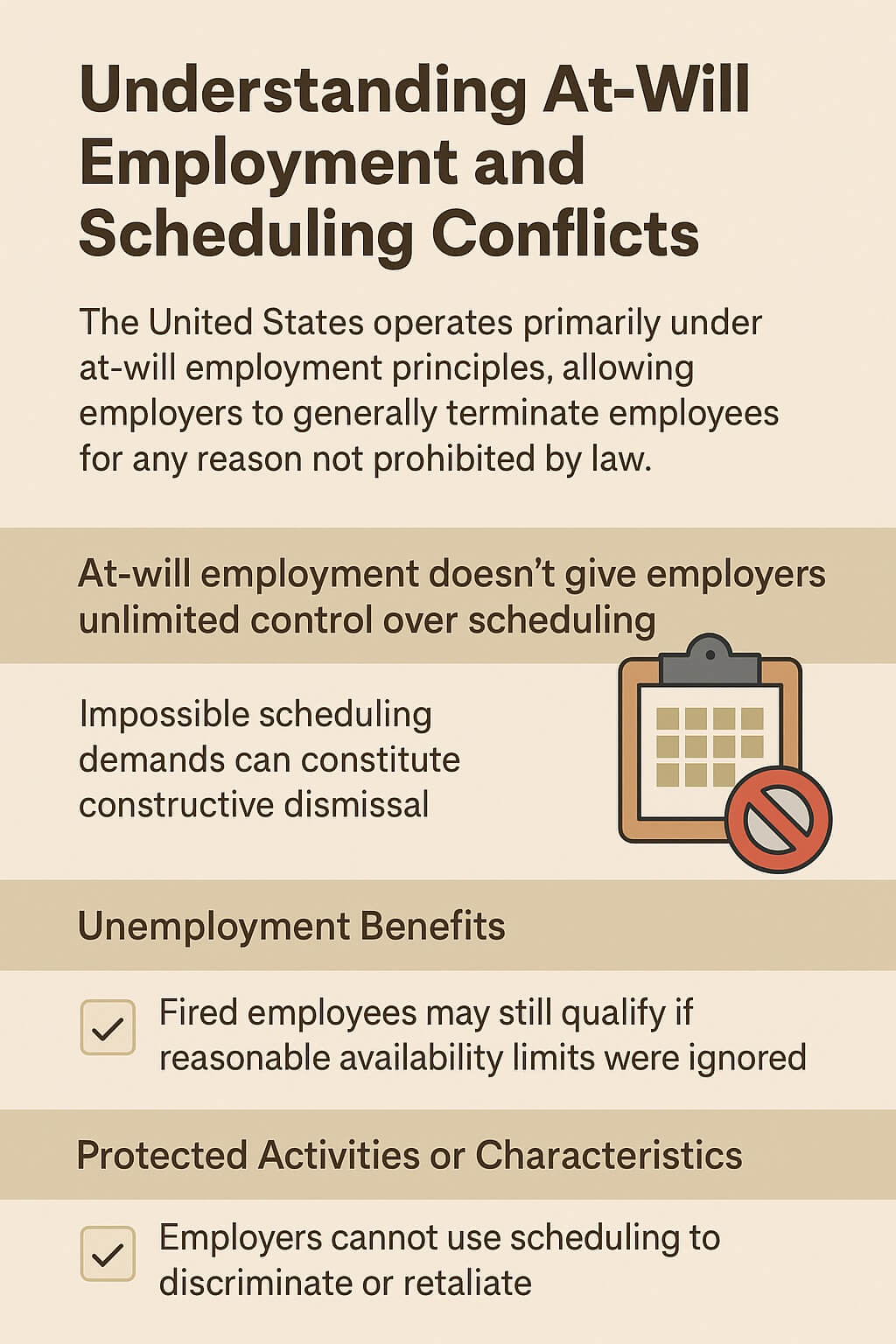
Federal Laws That Impact Employee Scheduling Rights
Several federal statutes provide indirect scheduling protections by requiring employers to accommodate specific employee needs or prohibiting discriminatory scheduling practices.
The Americans with Disabilities Act (ADA) requires employers to provide reasonable accommodations for qualified individuals with disabilities, which can include schedule modifications. Employees with medical conditions that affect their ability to work certain hours may request scheduling accommodations as long as they don’t create undue hardship for the employer.
Title VII of the Civil Rights Act requires employers to reasonably accommodate employee religious practices unless doing so would cause undue hardship. This protection extends to scheduling requests based on religious observances, sabbath requirements, or other faith-based scheduling needs.
The Family and Medical Leave Act (FMLA) provides eligible employees with the right to take unpaid leave for serious health conditions, military family leave, or bonding with new children. FMLA leave can be taken intermittently, which may require ongoing schedule modifications to accommodate medical appointments or caregiving responsibilities.
The Pregnancy Discrimination Act, as amended by the Pregnant Workers Fairness Act, requires employers to provide reasonable accommodations for pregnancy-related limitations, which may include schedule modifications for medical appointments or physical restrictions.
State-Level Fair Workweek and Predictive Scheduling Laws
A growing number of states and localities have enacted comprehensive scheduling laws that go beyond federal protections. These “fair workweek” or “predictive scheduling” laws typically require advance notice of work schedules, provide “predictability pay” for last-minute changes, and establish employee rights to request schedule modifications.
Oregon led the nation with its Fair Work Week Act, which covers large retail, food service, and hospitality employers. The law requires 14 days advance notice of work schedules, provides penalty pay for changes made with less notice, and gives employees the right to decline shifts scheduled with insufficient notice.
California’s Fair Workweek laws vary by municipality, with cities like San Francisco, Los Angeles, and Berkeley implementing their own requirements. These laws typically cover retail chains, fast-food restaurants, and other service industry employers with specific employee count thresholds.
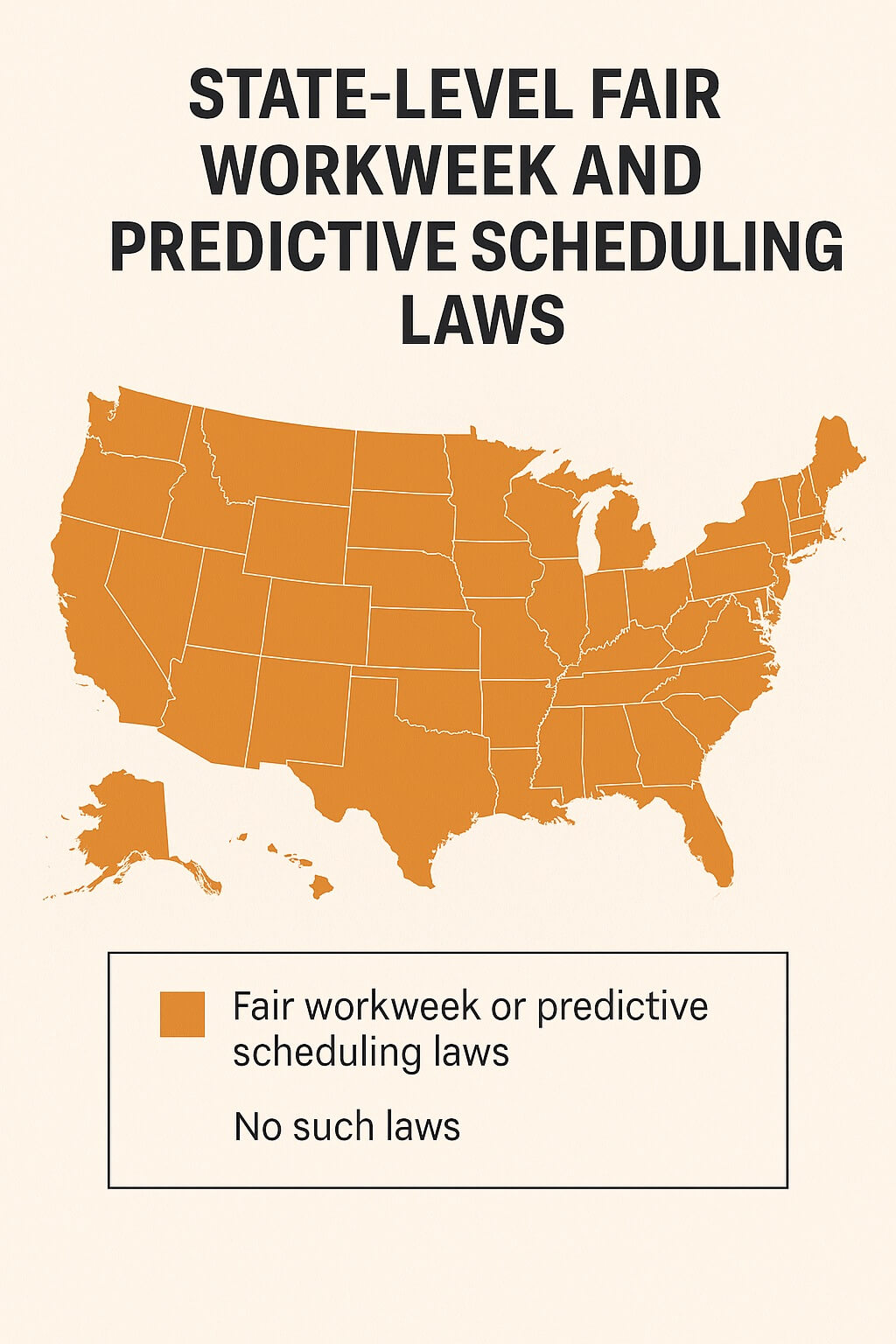
New York has implemented fair workweek protections in New York City and other municipalities, covering retail chains and fast-food establishments. These laws provide some of the most comprehensive scheduling protections in the country, including advance notice requirements and anti-retaliation provisions.
Chicago, Seattle, Philadelphia, and other major cities have enacted similar legislation, creating a growing patchwork of local scheduling protections. The specific requirements vary significantly between jurisdictions, but common elements include advance notice periods, predictability pay for schedule changes, and rights to refuse certain scheduling demands.
What Constitutes Illegal Scheduling Discrimination?
While employers generally have broad scheduling authority, they cannot use scheduling practices to discriminate against protected classes of employees. Understanding when scheduling becomes discriminatory helps employees identify potential violations and protect their rights.
Scheduling discrimination often manifests as consistently giving undesirable shifts to employees based on protected characteristics such as race, gender, age, religion, or disability status. For example, systematically assigning women to closing shifts in unsafe areas while giving men day shifts could constitute gender discrimination.
Retaliation through scheduling represents another form of illegal discrimination. Employers cannot punish employees for filing discrimination complaints, requesting accommodations, or exercising other protected rights by reducing their hours, assigning undesirable shifts, or creating unpredictable schedules.
Religious discrimination in scheduling occurs when employers fail to reasonably accommodate religious practices or deliberately schedule employees during times they’ve identified as conflicting with religious observances. The key test is whether accommodation would create undue hardship for the employer’s business operations.
Disability-related scheduling discrimination happens when employers refuse to consider schedule modifications that would enable qualified individuals with disabilities to perform their job duties. This includes failing to engage in the interactive process to identify potential accommodations or automatically rejecting scheduling accommodation requests.
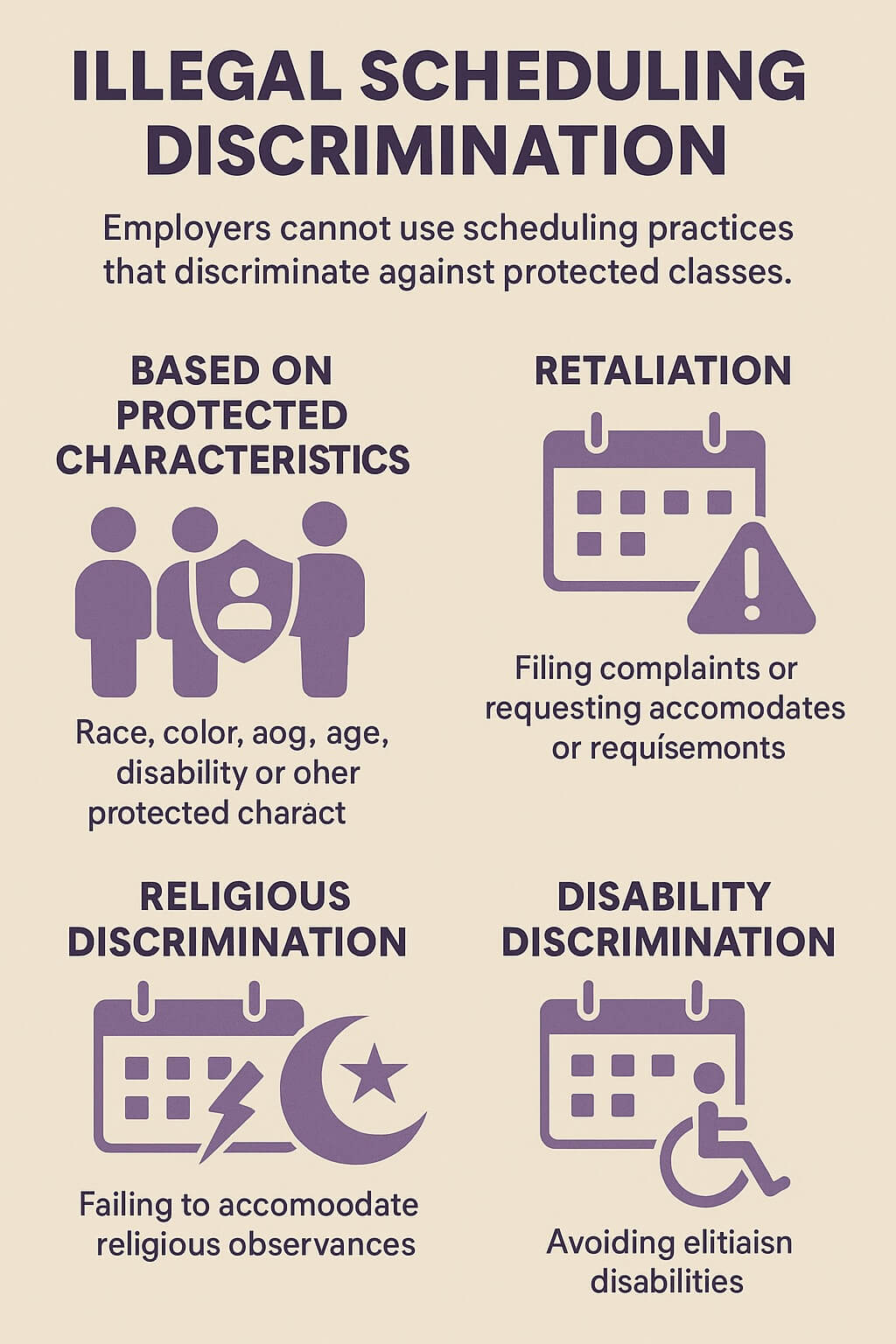
Employee Rights to Request Schedule Changes
While most employees don’t have guaranteed rights to specific schedules, various federal and state laws provide limited rights to request scheduling accommodations for specific purposes. Understanding these rights helps employees navigate scheduling conflicts more effectively.
Under the ADA, employees with disabilities have the right to request reasonable accommodations, which may include schedule modifications. The key requirements are that the employee be qualified to perform essential job functions and that the accommodation not create undue hardship for the employer.
Religious accommodation requests under Title VII give employees the right to request schedule changes to avoid conflicts with religious practices. Employers must reasonably accommodate these requests unless they would cause undue hardship to business operations.
FMLA provides eligible employees with the right to request intermittent leave for qualifying medical or family reasons. While not technically a scheduling accommodation, FMLA leave often requires ongoing schedule modifications to accommodate medical treatment or caregiving responsibilities.
Pregnancy-related accommodation requests under the Pregnant Workers Fairness Act may include schedule modifications for medical appointments, rest periods, or restrictions on working certain hours. The accommodation process follows similar principles to disability accommodation requirements.
Some state laws provide broader scheduling accommodation rights. For example, Vermont’s fair scheduling law gives all employees in covered industries the right to request schedule changes, though employers aren’t required to grant all requests.
How to Document Scheduling Violations and Workplace Issues
Effective documentation forms the foundation of any successful challenge to unfair scheduling practices. Whether pursuing internal resolution, filing government complaints, or considering legal action, comprehensive records strengthen employee positions and improve outcomes.
Start documenting from your first day of employment by saving your job application, offer letter, employee handbook, and any scheduling policies provided during orientation. These baseline documents establish the employer’s initial representations about scheduling expectations and policies.
Maintain detailed records of all scheduling communications, including when you communicated availability limitations, requested time off, or raised concerns about scheduling practices. Save emails, text messages, and written notices, and follow up verbal conversations with email summaries.
Create a scheduling log that tracks when you receive work schedules, any changes made after initial posting, and instances where you were scheduled during previously communicated unavailable times. Include dates, times, and circumstances for each entry to establish patterns of problematic scheduling.
Document the impact of scheduling problems on your life, including childcare costs incurred due to last-minute changes, educational opportunities missed because of unpredictable schedules, or health issues resulting from scheduling stress. These impacts can be relevant for legal claims and unemployment benefit determinations.
Keep records of any complaints you’ve made about scheduling issues and your employer’s responses. This documentation helps establish that you attempted to resolve problems through proper channels before pursuing external remedies.
When Scheduling Practices Become Constructive Dismissal
Constructive dismissal occurs when employer actions make continued employment so intolerable that a reasonable person would feel compelled to quit. Unreasonable scheduling practices can support constructive dismissal claims, particularly when employers ignore clearly communicated availability limitations or use scheduling as punishment.
Courts evaluate constructive dismissal claims by considering whether the employer’s conduct was so unreasonable that resignation was the only viable option. This analysis includes examining the employee’s efforts to resolve the conflict and the employer’s response to those efforts.
Scheduling practices that may support constructive dismissal claims include consistently scheduling employees during times they’ve clearly indicated unavailability, providing schedules with insufficient notice to maintain childcare or transportation arrangements, or dramatically changing established scheduling patterns without justification.
The key to successful constructive dismissal claims is demonstrating that the employer’s scheduling practices fundamentally altered the terms and conditions of employment in ways that made continued work impossible. This typically requires showing a pattern of unreasonable conduct rather than isolated incidents.
Before resigning based on scheduling conflicts, employees should document their attempts to resolve the issues through internal company procedures and provide written notice of specific scheduling problems. This documentation strengthens potential unemployment benefit claims and legal actions.
The Role of HR in Scheduling Dispute Resolution
Human Resources departments can provide valuable assistance in resolving scheduling conflicts, but their primary obligation is protecting company interests rather than advocating for individual employees. Understanding HR’s role and limitations helps employees approach these conversations strategically.
When presenting scheduling concerns to HR, frame issues as business problems that affect productivity, employee retention, and potential legal liability rather than personal complaints about inconvenience. This approach aligns employee interests with company interests and increases the likelihood of meaningful resolution.
Prepare specific documentation before meeting with HR, including examples of scheduling problems, evidence of attempts to resolve issues with direct supervisors, and concrete suggestions for improvement. This preparation demonstrates professionalism and helps HR understand the scope of the problem.
Follow up HR conversations with written summaries of what was discussed and any commitments made. This documentation can be valuable if problems persist or if you need to pursue external complaints or legal action. Email summaries also help ensure everyone understands agreed-upon solutions.
Be realistic about HR’s ability to mandate specific scheduling changes. While HR can investigate policy violations and recommend improvements, they cannot override legitimate business needs or force supervisors to accommodate every employee preference.
Filing Complaints: EEOC, State Agencies, and Labor Departments
When internal resolution fails, employees have several options for filing external complaints about scheduling violations, depending on the specific legal issues involved and applicable state or federal laws.
The Equal Employment Opportunity Commission (EEOC) handles complaints related to discrimination, retaliation, and failure to accommodate under federal employment laws. Scheduling practices that discriminate based on protected characteristics or retaliate against employees for asserting their rights fall under EEOC jurisdiction.
State civil rights agencies provide alternative forums for discrimination complaints and often have broader protections than federal law. Many states have their own fair employment practices acts that may provide stronger scheduling protections or cover smaller employers not subject to federal requirements.
Department of Labor agencies at both federal and state levels address wage and hour violations, including some scheduling-related issues. While their primary focus involves payment of wages, they also investigate workplace practices that affect employee compensation.
Local agencies in jurisdictions with fair workweek laws typically handle scheduling-specific complaints. These agencies often have specialized expertise in scheduling law violations and can impose penalties specifically designed to address predictive scheduling violations.
Before filing external complaints, understand the time limits, procedural requirements, and potential outcomes for each type of claim. Some agencies require internal complaint processes to be exhausted before accepting cases, while others have strict filing deadlines that begin when violations occur.
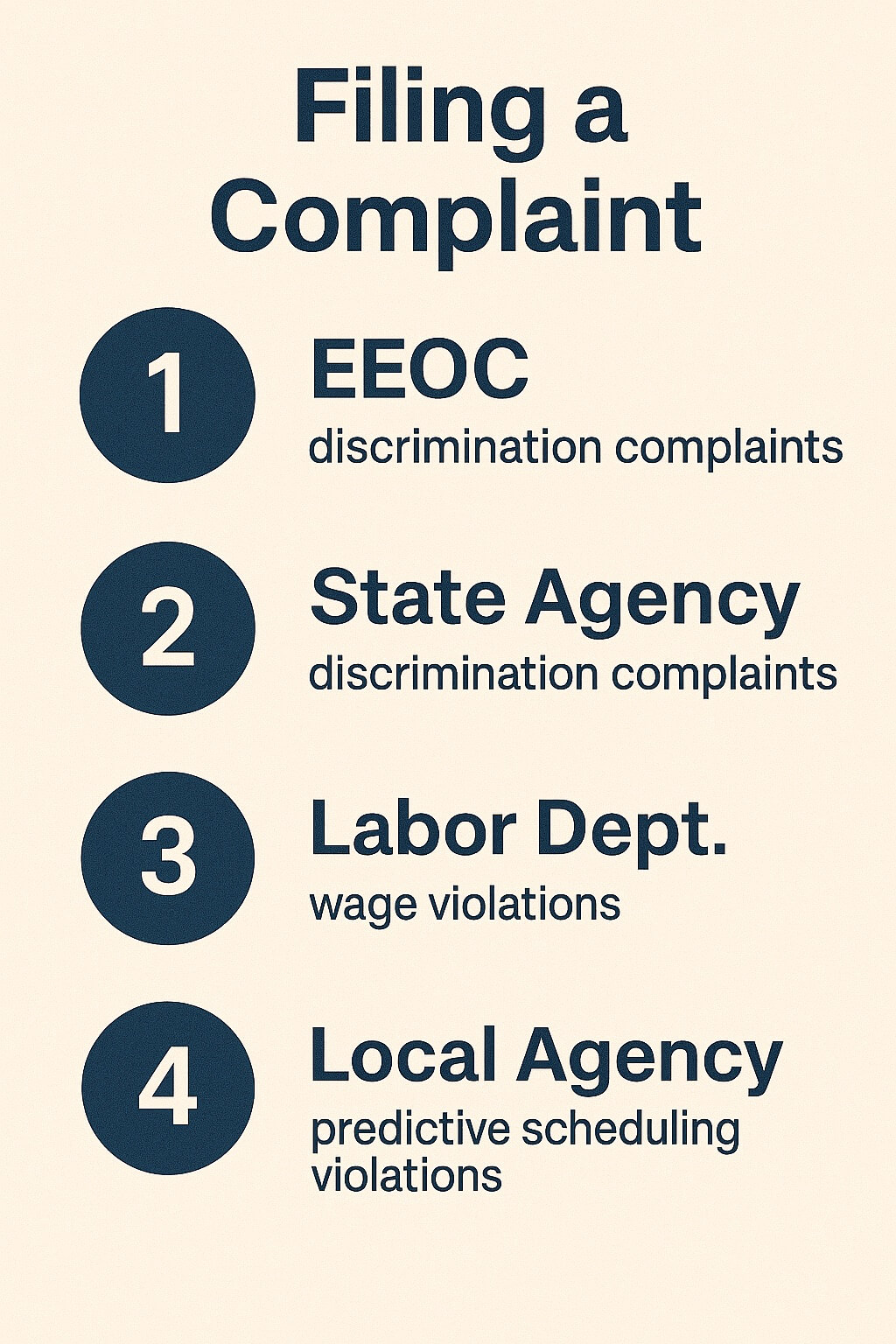
Union Protections and Collective Bargaining Agreements
Unionized employees often enjoy significantly stronger scheduling protections than those available under employment law alone. Collective bargaining agreements frequently address scheduling issues through specific contract provisions and grievance procedures that provide faster resolution than legal action.
Common union contract provisions include seniority-based scheduling systems that give preference to more experienced employees for desirable shifts, advance notice requirements that exceed legal minimums, and limits on consecutive shifts or mandatory overtime.
Many union contracts establish bidding procedures for regular schedules that allow employees to request specific shift assignments based on seniority and qualifications. These systems provide predictability and fairness that purely management-controlled scheduling often lacks.
Grievance procedures in union contracts typically provide expedited resolution of scheduling disputes through neutral arbitration. These processes often resolve conflicts more quickly and cost-effectively than court litigation while providing binding decisions that both parties must follow.
Even non-union employees may benefit from union advocacy if their workplace is undergoing organizing efforts. The National Labor Relations Act protects employees’ rights to engage in collective action regarding working conditions, including scheduling practices that affect multiple employees.
Retail Worker Scheduling Rights Across Different States
Retail workers face particular scheduling challenges due to variable customer traffic, seasonal fluctuations, and employer cost-cutting measures. However, they also benefit from targeted scheduling legislation in multiple states that specifically addresses retail industry practices.
Oregon’s Fair Work Week Act covers retail establishments with 500+ employees worldwide, requiring 14 days advance notice of work schedules and predictability pay for changes made with less notice. The law also provides employees with the right to rest between shifts and limits on consecutive days worked.
California’s approach varies by municipality, with different cities implementing their own retail scheduling requirements. San Francisco’s Fair Workweek Ordinance covers formula retail establishments with 40+ locations worldwide, while Los Angeles focuses on larger employers with specific employee count thresholds.
New York City’s Fair Workweek Law applies to retail chains with 20+ locations worldwide, providing comprehensive protections including advance notice, good faith scheduling estimates, and rights to request additional hours before employers hire new staff.
Seattle’s Secure Scheduling Ordinance covers retail establishments with 500+ employees worldwide and full-service restaurants with 500+ employees and 40+ locations worldwide. The law provides 14 days advance notice and predictability pay for schedule changes.
Restaurant and Food Service Industry Scheduling Protections
Restaurant workers face unique scheduling challenges due to variable customer demand, tipping structures, and the prevalence of irregular employment arrangements. While comprehensive scheduling protections are less common in food service than retail, several jurisdictions have implemented specific requirements for restaurant employers.
Seattle’s scheduling ordinance covers full-service restaurants with 500+ employees and 40+ locations worldwide, providing advance notice requirements and predictability pay for schedule changes. The law recognizes that restaurant workers depend on predictable schedules to maximize tipping opportunities.
New York City’s Fair Workweek Law covers fast food establishments with 30+ locations nationwide, providing comprehensive scheduling protections including advance notice, good faith estimates, and anti-retaliation provisions specifically designed for fast food workers.
Chicago’s Fair Workweek Ordinance applies to restaurants with 250+ employees and 30+ locations worldwide, along with bars and coffee shops meeting similar thresholds. The law provides 10 days advance notice and predictability pay for changes.
San Francisco’s Fair Workweek Ordinance covers formula retail food establishments, including chain restaurants and coffee shops with specific size requirements. The law provides 14 days advance notice and comprehensive scheduling protections.
Beyond specific scheduling laws, restaurant workers also benefit from federal and state wage and hour protections that can be affected by scheduling practices. Employers who schedule workers in ways that prevent required meal breaks or result in overtime violations may face additional liability.
Healthcare Worker Scheduling Considerations and Protections
Healthcare workers face distinct scheduling challenges due to patient care requirements, mandatory overtime issues, and the need for continuous coverage. While comprehensive scheduling laws rarely apply to healthcare settings, various regulations address specific aspects of healthcare worker scheduling.
Many states have implemented mandatory overtime restrictions for nurses and other healthcare workers, recognizing that excessive hours can compromise patient safety. These laws typically prohibit employers from requiring healthcare workers to work beyond normal shifts except in emergency situations.
The Joint Commission and other healthcare accreditation bodies have established guidelines for healthcare worker fatigue management that affect scheduling practices. These standards require healthcare facilities to address scheduling practices that may compromise patient safety through worker fatigue.
Union contracts in healthcare settings often provide comprehensive scheduling protections, including self-scheduling systems, limits on floating between units, and premium pay for short-notice schedule changes. These contractual protections typically exceed legal minimums.
FMLA protections are particularly relevant for healthcare workers, as the demanding nature of healthcare work often creates medical conditions that require intermittent leave. Healthcare employers must accommodate FMLA requests even when they create scheduling challenges.
The Americans with Disabilities Act applies to healthcare settings and may require schedule accommodations for healthcare workers with disabilities. Common accommodations include modified shift schedules, break accommodations, and restrictions on certain types of patient assignments.
Part-Time vs Full-Time Employee Scheduling Rights
The distinction between part-time and full-time employment affects scheduling rights in several important ways, though both categories of employees retain basic protections under federal and state employment laws.
Full-time employees often receive additional scheduling stability through company policies, union contracts, or state laws that provide benefits based on full-time status. However, fair workweek laws typically apply equally to part-time and full-time employees in covered industries.
Many employers use part-time scheduling to avoid providing benefits or to maintain maximum scheduling flexibility. However, this practice doesn’t eliminate the employer’s obligation to comply with applicable scheduling laws or anti-discrimination requirements.
Some jurisdictions specifically address part-time worker rights in their scheduling legislation. For example, several cities require employers to offer additional hours to existing part-time employees before hiring new workers, helping ensure that part-time workers who want additional hours can access them.
The classification of workers as part-time versus full-time can also affect eligibility for family and medical leave, disability accommodation, and other protections that may include scheduling components. Employees who believe they’ve been misclassified to avoid scheduling protections may have grounds for additional claims.
Independent Contractors vs Employees: Scheduling Rights Differences
The classification of workers as independent contractors versus employees significantly affects scheduling rights, as most employment law protections apply only to employees rather than contractors.
True independent contractors generally control when and how they perform work, which means they retain scheduling autonomy but lose the protections available to employees under fair workweek laws, anti-discrimination statutes, and other employment legislation.
However, many employers misclassify employees as independent contractors to avoid scheduling law obligations and other employment protections. Courts and agencies apply various tests to determine whether a worker is truly an independent contractor, including the degree of control over scheduling and work performance.
Workers classified as independent contractors who lack actual control over their schedules may be misclassified employees entitled to full scheduling protections. This is particularly common in gig economy settings where companies claim workers are contractors while maintaining significant control over scheduling and work performance.
The rise of app-based work platforms has created new questions about scheduling rights for workers who may be independent contractors but face algorithmic scheduling systems that effectively control their work opportunities. Several states are considering legislation to address these hybrid employment relationships.
Technology and Scheduling: Apps, Algorithms, and Employee Rights
Modern scheduling technology creates new opportunities for both scheduling flexibility and potential rights violations. Understanding how technology affects scheduling rights helps employees navigate increasingly complex workplace systems.
Many employers use scheduling software that can accommodate employee availability preferences and automatically generate schedules that comply with legal requirements. However, these systems can also be programmed to minimize labor costs in ways that disadvantage employees through unpredictable scheduling.
Mobile scheduling apps often provide employees with real-time schedule information and the ability to request changes or swap shifts. While these features can improve work-life balance, they may also create pressure for employees to be constantly available for schedule changes.
Algorithmic scheduling systems used by some large employers can inadvertently create discriminatory patterns if they’re programmed with biased assumptions about employee availability or performance. These systems require careful monitoring to ensure compliance with anti-discrimination laws.
On-call scheduling through mobile apps has become increasingly common, particularly in retail and food service. However, excessive on-call requirements may violate fair workweek laws and create wage and hour issues if employees must remain available without guaranteed compensation.
Building a Strong Case: Evidence Collection and Legal Strategy
Successfully challenging unfair scheduling practices requires systematic evidence collection and strategic thinking about available legal remedies. Building a strong case begins with understanding which laws apply to your situation and what evidence will be most persuasive.
Document everything related to your scheduling concerns, including initial job postings, interview discussions about scheduling expectations, employee handbook provisions, and any written or verbal communications about availability or scheduling preferences.
Collect evidence of scheduling patterns that show discrimination, retaliation, or violations of applicable fair workweek laws. This includes comparing your schedules to those of similarly situated employees, tracking advance notice periods, and recording instances where scheduling requests were denied without explanation.
Preserve electronic evidence by taking screenshots of scheduling apps, saving text messages and emails, and backing up electronic records to personal devices or accounts. Electronic evidence can disappear quickly if employers modify systems or if you lose access to company accounts.
Identify potential witnesses who can support your claims, including coworkers who have observed scheduling problems, customers who have witnessed scheduling-related incidents, or managers who have made statements about scheduling practices.
Consult with employment attorneys who specialize in scheduling law or workplace discrimination before making major decisions about how to proceed. Many attorneys provide free consultations for employment cases and can help evaluate the strength of potential claims.
The Financial Impact of Unpredictable Scheduling on Workers
Unpredictable work schedules create significant financial hardships for workers that extend far beyond immediate wage losses. Understanding these broader impacts helps explain why scheduling rights have become such an important workplace issue.
Variable schedules make it difficult for workers to budget household expenses or plan major purchases because they cannot predict their income from week to week. This uncertainty affects everything from housing decisions to childcare arrangements and educational opportunities.
Last-minute schedule changes often force workers to incur additional expenses for childcare, transportation, or other services they wouldn’t need with predictable schedules. These costs can quickly offset any wages earned from the additional or changed shifts.
Unpredictable scheduling interferes with workers’ ability to maintain second jobs or pursue education and training opportunities that could improve their long-term economic prospects. This creates a cycle where workers remain trapped in low-wage positions.
The stress and health impacts of unpredictable scheduling can result in additional medical expenses and lost productivity that further compound the financial impacts of irregular work schedules.
Research consistently shows that predictable scheduling improves worker productivity, reduces turnover, and enhances customer service, suggesting that fair scheduling practices benefit both employees and employers in the long term.
Future Trends in Employee Scheduling Rights Legislation
The landscape of employee scheduling rights continues to evolve as more jurisdictions recognize the importance of predictable work schedules for worker wellbeing and economic security. Understanding emerging trends helps workers anticipate future protections and advocates plan strategic campaigns.
Federal legislation addressing scheduling rights has been introduced in Congress, though comprehensive national scheduling protections remain unlikely in the near term. However, federal agencies have begun examining scheduling practices as part of broader workplace enforcement efforts.
State-level legislation is expanding beyond initial focus areas like retail and fast food to cover additional industries including healthcare, hospitality, and building services. This expansion reflects growing recognition that scheduling problems affect workers across multiple sectors.
Technology-focused scheduling legislation is emerging as lawmakers grapple with algorithmic scheduling systems, on-call arrangements facilitated by mobile apps, and the scheduling rights of gig economy workers who may be classified as independent contractors.
The COVID-19 pandemic highlighted the importance of scheduling flexibility and worker safety, leading to new discussions about emergency scheduling protections and the intersection of scheduling rights with public health requirements.
International examples of scheduling rights legislation, particularly from European countries with stronger worker protections, continue to influence American policy discussions and provide models for potential future legislation.
Protecting Your Scheduling Rights in America
Employee scheduling rights in the United States remain a complex patchwork of federal, state, and local protections that vary significantly based on location, industry, and employer characteristics. While most workers don’t have guaranteed rights to specific schedules, various laws provide important protections against discriminatory scheduling practices and, in some jurisdictions, basic predictability requirements.
The key to protecting your scheduling rights lies in understanding which laws apply to your specific situation, documenting problems carefully, and pursuing appropriate remedies through internal company processes, government agencies, or legal action when necessary. Whether dealing with discriminatory scheduling, failure to accommodate disabilities or religious practices, or violations of local fair workweek laws, workers have options for addressing unfair scheduling practices.
As the American economy continues to evolve and more jurisdictions recognize the importance of predictable work schedules, employee scheduling rights will likely continue to expand. Workers who understand their current rights and document scheduling problems effectively will be best positioned to benefit from these protections and advocate for continued improvements in scheduling fairness.
Citations and References
- U.S. Department of Labor, Wage and Hour Division. (2021). “Fair Labor Standards Act.“
- Equal Employment Opportunity Commission. (2021). “Enforcement Guidance on Reasonable Accommodation and Undue Hardship Under the Americans with Disabilities Act.“
- National Labor Relations Board. (2021). “Employee Rights.”
- Center for Women and Work, Rutgers University. (2019). “Stable Scheduling Study.”
- Economic Policy Institute. (2020). “Irregular Work Scheduling and Its Consequences.“
- Berkeley Center for Labor Research and Education. (2021). “Fair Workweek Laws.“
- Oregon Bureau of Labor and Industries. (2021). “Fair Work Week Act.”
- Seattle Office of Labor Standards. (2021). “Secure Scheduling Ordinance.“
- New York City Department of Consumer and Worker Protection. (2021). “Fair Workweek Law.”
- Congressional Research Service. (2020). “Predictive Scheduling Laws in the United States.“
- Society for Human Resource Management. (2021). “Workplace Flexibility Survey.”
- U.S. Bureau of Labor Statistics. (2021). “Work Schedules: Shift Work and Alternative Arrangements.”
